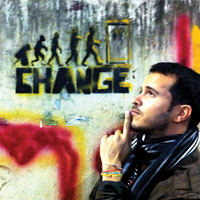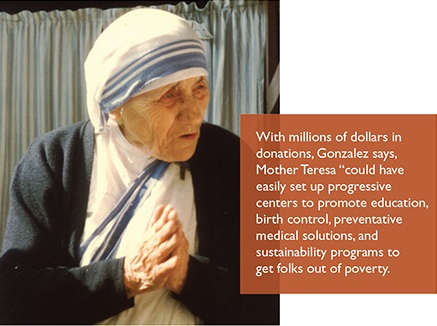The Humanist Interview with Hemley Gonzalez

Hemley Gonzalez is revolutionizing humanitarian efforts with Responsible Charity, a nonprofit humanist organization he founded in 2009 that is making strides in “education, planned parenthood, and self-employment” in India. In June 2013, after years of planning and fundraising, Responsible Charity finally leased a property to establish the first secular school in Kolkata, West Bengal, for impoverished children and their families. “Our work goes beyond education,” says Gonzalez, “as we deal directly with the families of children we help, and we learn more and more about the harsh realities they face each day while living in poverty.”
Responsible Charity calls itself a humanist charity, assisting the poor in India with a variety of needs (as shown in the photos on the opposite page), including education, English classes, medical and nutritional assistance, family planning, microloans, assistance in rebuilding living spaces and repairing vehicles and appliances, and implementing sustainable lighting.
Gonzalez was personally touched by the struggles of the oppressed long before founding Responsible Charity. “My grandmother risked her life when she left Cuba and migrated to the United States during the 1980 Mariel Boat-lift that took place between the Havana harbor and the Florida straits,” Gonzalez recalls. “By doing so she gave me and my family opportunities we never had. My parents too risked their future and careers when they decided to follow in my grandmother’s footsteps in 1989 to save me from what undoubtedly would have been a life of lies, misfortune, and disappointment on the communist island.”
After graduating high school, Gonzalez began a successful real estate career in Miami Beach. During the 2007 financial crisis he decided to reconnect with his “compassionate and creative side” and went backpacking across India for several months. Eventually he volunteered at the Missionaries of Charity, the world-renowned organization founded by Mother Teresa, to care for the so-called wretched of the earth. It wasn’t long before he saw the barbaric realities of this order and founded the Facebook group “Stop the Missionaries of Charity” to expose their operations.
THE HUMANIST: What inspired you to start “STOP the Missionaries of Charity?”
HEMLEY GONZALEZ: For a period of two months in 2008, I worked as a volunteer in one of Mother Teresa’s homes for the poor in Calcutta, India. I was shocked to discover the horrifically negligent manner in which this charity operates, in direct contradiction of the public’s general understanding of their work.
Workers washed needles under tap water and then reused them. Medicine and other vital items were stored for months on end, expiring and still applied sporadically to patients. Volunteers with little or no training carried out dangerous work on patients with highly contagious cases of tuberculosis and other life-threatening illnesses. The individuals who operated the charity refused to accept and implement medical equipment and machinery that would have safely automated processes and saved lives.
After further investigation and research, I realized that all of the events I’d witnessed amounted to nothing more than a systematic human rights violation and a financial scam of monumental, criminal proportions.
Not once in its sixty-year history has this organization, the Missionaries of Charity, reported the total amount of funds it’s collected in donations, what percentage is used for administration, or where the rest has been applied and how. Defectors and independent journalists have placed the figure since the charity’s inception upwards of $1 billion (and counting). The mission currently operates over 700 homes in over 100 countries and maintains an average of 4,000 workers while consistently failing to provide statistics on the efficacy of their work.
 THE HUMANIST: What was Mother Teresa’s direct role in all of this?
THE HUMANIST: What was Mother Teresa’s direct role in all of this?
GONZALEZ: Standing firm against family planning, modernization of equipment, and a myriad of other solution-based initiatives, Mother Teresa was not a friend of the poor but rather a promoter of poverty. During an interview she admitted herself that more than 23,000 people had died in the halls of the particular home I worked in. It was as if she were boasting at the figure and missing entirely the point of the enormous compilation of unnecessary deaths.
Mother Teresa also repeatedly admitted that she was not a social worker, and her followers continue to assert the same to this day. So under what motives do they tend to the poor you may ask? The mantra of the operation rests solely on the belief that suffering and poverty are ways of loving God, a seriously troubling statement to say the least.
I created the Facebook group called “STOP the Missionaries of Charity” to denounce their work while educating unsuspecting donors about how their well-intended donations are misused on a daily basis. Continuing to air these facts about Mother Teresa’s Missionaries of Charity and similar organizations will help point donors everywhere in the world to responsible, accountable, and transparent organizations instead.
THE HUMANIST: What were the general reactions to the Facebook campaign?
GONZALEZ: The global community is generally apprehensive of criticism against Mother Teresa until they stop to analyze all the information available on the subject, and the different accounts of people from all walks of life including doctors, nurses, teachers, therapists, professors, students, journalists, everyday people, and even former nuns. Of course, there are those blinded by religion or decades of well-orchestrated propaganda about this woman who automatically go into attack or defense mode, but as one can see by the number of comments and debates on the page, the reaction is a positive one, and by positive I mean the world is finally starting to see this organization for the fraud it truly is.
THE HUMANIST: Do you think Mother Teresa’s “saintly” image has changed in recent years?
GONZALEZ: Absolutely. Journalists like Christopher Hitchens, although controversial for some, and others with firsthand research and experiences such as Dr. Aroup Chatterjee, along with celebrities like Anne Rice, have opened the door for a wider audience to examine the Missionaries of Charity closer. The saintly image is no longer an automatic label for Agnes Gonxhe Bojaxhiu.
THE HUMANIST: Based on your experiences, what do you think is the real legacy of Mother Teresa?
GONZALEZ: History will not be kind to her. We live in an age in which information is widely distributed and the Catholic Church’s farces and suppressed facts can no longer be easily hidden. The real legacy is one built upon lies and the unnecessary suffering of countless human beings.
THE HUMANIST: Do you think that Mother Teresa hurt more people than she helped?
GONZALEZ: As the leader of one of the Vatican’s most successful branches, her regressive policies, religious fanaticism, and promotion of poverty have clearly left a shameful mark on humanity. Receiving millions and millions of dollars in donations, here’s a woman who could have easily set up progressive centers to promote education, birth control, preventative medical solutions, and sustainability programs to get folks out of poverty.
THE HUMANIST: Could you describe your experience at the mission where you volunteered?
GONZALEZ: From providing patients with medical assistance, to bathing convalescent men, cleaning feces and urine, washing clothes soiled with contaminating agents, being exposed to tuberculosis, cremating a dozen human bodies, witnessing shocking medical negligence, and having my proposed solutions constantly rejected by the nuns in charge, my experience was nothing less than a horrific, eye-opening and life-changing catharsis.
THE HUMANIST: In Forbes India, you mentioned the unsanitary conditions and medieval methods implemented in the missions. What do you think is the primary cause for the cruelty you witnessed?
GONZALEZ: To put it bluntly? The worship of superstition and sadism, and likely mental illness. I’ve read pretty much everything that has been written about Mother Teresa (I’ve had to in order to fend off critics) and over and over the same undertone surfaces, especially in her own writings (for example, Come Be My Light, a 2009 collection of her personal letters with confessors over the years). Her unnatural obsession with suffering, the ingrained image of an unattainable and absent Jesus, and a narrow-minded view of the real world reveal the inner thoughts of a troubled individual to say the least.
Young women, especially those who are vulnerable and in distress, are recruited by the Missionaries of Charity and are then plunged into a life of restriction and deprivation of reality. In many cases (like in India and other developing regions of the world) they join the organization to escape poverty, thinking a constant meal and a roof over their head in return for some charitable work may not be a bad “deal” after all. Unfortunately many of them end up feeling trapped and stripped of their individuality and find it almost impossible to leave over the years.
By all accounts, this organization is nothing less than a glorified cult. Studies performed by those who believe that some religious groups do practice mind control have identified the following key steps that are effective for coercive persuasion.
- People are put in physical or emotionally distressing situations.
- Their problems are reduced to one simple explanation, which is repeatedly emphasized.
- They receive what seems to be unconditional love, acceptance, and attention from a charismatic leader or group.
- They get a new identity based on the group.
- They are subject to entrapment (isolation from friends, relatives, and the mainstream culture) and their access to information is severely controlled.
THE HUMANIST: How does Responsible Charity differ from the Missionaries of Charity and other religious organizations?
GONZALEZ: Unlike some religion-based organizations that have no progressive plans in effect to educate and empower children, women, and men out of poverty, we are doing so by making advances in areas of education and family planning, as well as creating and promoting self-sustainability. All of this, of course, is conducted in full financial transparency.
